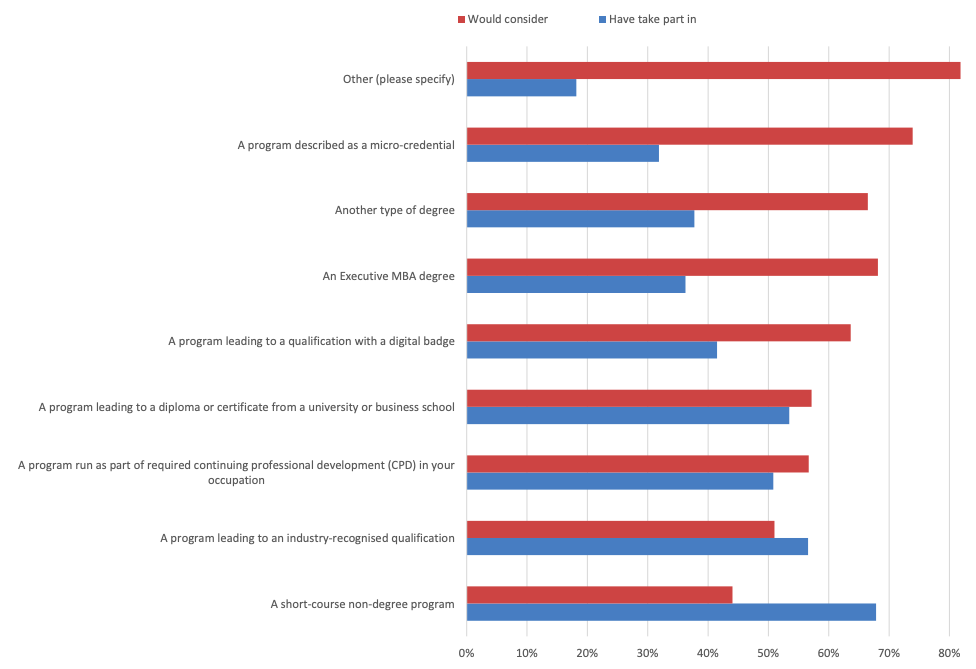
Executive Education or a Full-Time MBA for Entrepreneurs
Choosing between a traditional full-time MBA and an executive education program is expectedly a difficult decision. And more so for an entrepreneur. Here are a few points that will help you make the right choice.
Also read: Executive Education Trends 2023
To begin with, here are a few types of learning undertaken and considered by individuals.

*Source: CarringtonCrisp Executive Education Futures 2018 Study
There are a few more points to consider before you make an educated choice.
Audience
The way that executive education programs and MBAs are designed are quite different. Executive education programs are typically designed to fit the needs of senior executives, high-potential and high-performing emerging business leaders and professionals, as well as family business owners and entrepreneurs. While MBAs are designed for students following a traditional path of formal education. And although there is usually no age limit to who can take up an MBA, it targets the basics. On the other hand, executive education programs tend to have age eligibility among others, but you can find programs specifically formulated for entrepreneurs. This has a lot of value for any entrepreneur when compared to a full-time MBA.
Overall program design
While each instruction has its pros, as mentioned, executive education is typically designed to fit the needs of senior executives or professionals with at least some amount of experience. The curriculum, structure, etc is curated keeping in mind what is required when you consider the current global professional scenario, which is essential for any business person, including entrepreneurs. While a traditional MBA does have its merit, it tends to be more theory-based with a curriculum that might not be up to date.
Flexibility
When it comes to the time an entrepreneur can allot to things other than their startup, it’s not much. That’s where an executive education program is more beneficial than a full-time MBA. There are a lot of options with executive education programs that are structured to be multi-modular. This means they include classroom sessions as well as online sessions. So entrepreneurs can work out a schedule for themselves where they are able to manage their work commitments alongside their executive education program, all the while applying what they have learned to their startup, almost immediately, without having to wait a year or more.
Networking
This is a big one for entrepreneurs. Startups love good networking. It’s not to say you can’t network at a traditional MBA, but being that a majority of the class will be doing it as a natural progression from their previous degree, they probably don’t have a business of their own or much work experience for that matter. At an executive education program your peers will also be either entrepreneurs or other business professionals. The value in those interactions and that network far outweighs that of a full-time MBA.
Global context
Imperative in an ever-changing market, constant technology updates, changing demographics, new industries, and so much more, the professional equipment required to lead is also under constant change. Globalization of the market calls for globalization of the lessons taught to future business leaders. Executive education programs are far better at keeping information relevant to current global situations than full-time MBAs.
While every executive education program is different, the value it provides is unmistakable, especially for entrepreneurs.
FAQs
Q. What is the primary difference between MBAs and executive education programs?
A. They are both aimed at different audiences. While executive education programs are designed to fit the needs of senior executives, high potential and high-performing emerging business leaders and professionals, as well as family business owners and entrepreneurs, MBAs are designed for students following a traditional path of formal education.
Q. What makes the structure of an executive education program more suited for entrepreneurs?
A. Executive education programs are structured to be multi-modular. This means they include classroom sessions as well as online sessions. So entrepreneurs can work out a schedule for themselves where they are able to manage their work commitments alongside their executive education program, all the while applying what they have learned to their startup, almost immediately, without having to wait till they complete the program.


















